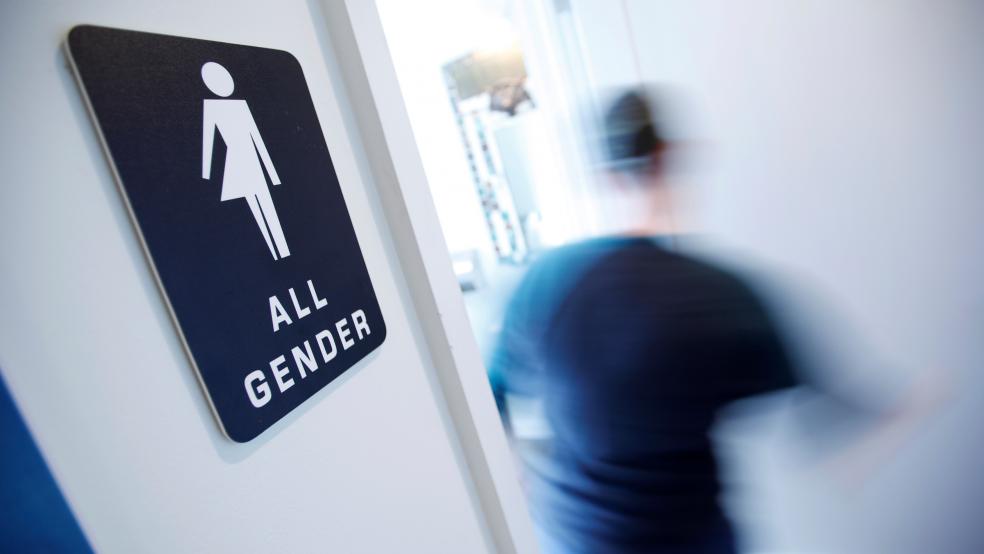It could end up costing his state hundreds of millions of dollars from major employers and in federal aid, but GOP North Carolina Gov. Pat McCrory filed suit on Monday against the Obama administration in defense of his state’s controversial new “bathroom” law – one that the Justice Department insists abridges the civil rights of gay and transgender people.
The Justice Department has concluded that the North Carolina law barring LGBT people from using public restrooms that do not correspond to the gender of their birth violated Title VII of the 1964 Civil Rights Act.
Related: North Carolina Officials Sue U.S. Justice Dept. Over Transgender 'Bathroom Law'
The Justice Department’s top civil rights lawyer, Vanita Gupta, had given McCrory until today to signal whether or not he would “remedy” the violations by amending the law and notifying state employees they are entitled to use public bathrooms and other facilities consistent with their gender identity.
But McCrory charged in federal court that the Obama administration had engaged in “baseless and blatant overreach” that could affect other states and private businesses across the country.
“The Obama administration is bypassing Congress by attempting to rewrite the law and set restroom policies for public and private employers across the country, not just North Carolina,” he said. “This is now a national issue that applies to every state and it needs to be resolved at the federal level.”
“Our nation is one nation, especially when it comes to fighting discrimination, which I support wholeheartedly,” McCrory said during a brief appearance in the state capital today. “Ultimately, I think it’s time for the U.S. Congress to bring clarity to our national anti-discrimination provisions under Title VII and Title IX.
Related: North Carolina Lawmaker -- 'We Must Fight to Keep Our State Straight'
McCrory and his Republican allies in the state legislature are swimming upstream in challenging the Justice Department’s interpretations of civil rights law and ignoring widespread sentiment of business leaders, gay rights activists and average Americans that the law is off the grid.
A majority of Americans oppose laws that require transgender individuals to use bathroom facilities that do not correspond to their gender identity, according to a new CNN/ORC Poll released today. The survey of 1,001 adults, conducted April 28 to May 1, asked, “Overall, would you say you favor or oppose laws that require transgender individuals to use facilities that correspond to their gender at birth rather than their gender identity?”
Fifty-seven percent of those interviewed said they oppose laws like the one in North Carolina, compared to just 39 percent who support them. Republicans were more inclined to support transgender discrimination laws than Democrats, according to the survey. But even there, Republicans are evenly split on laws of this nature, with 48 percent saying they favor them and 48 percent opposed.
The pollsters noted that the latest findings are similar to Americans’ attitudes about the legalization of gay marriage, with Democrats and more moderate Republicans are in favor while more conservative Republicans are opposed.
Even billionaire Donald Trump, the presumptive Republican presidential nominee, has opposed the North Carolina law, arguing initially that the measure was passed to address essentially a non-existent problem.
Related: North Carolina Transgender Law Violates Civil Rights Law
Trump said during an interview in late April with NBC’s Today Show that “there have been very few problems” with transgender people using the public bathrooms of their choice and that North Carolina should “leave it the way it is.” However, he subsequently softened his criticism of the law in the face of a backlash from Sen. Ted Cruz of Texas and other social conservatives.
Cruz, who was then challenging Trump for the GOP presidential nomination, declared at a rally in Frederick, Maryland, that “Donald on television this morning said gosh he thought men should be able to go into the girls’ bathrooms if they want to. Now let me ask you: Have we gone stark raving nuts?”
Trump subsequently tempered his opposition to the North Carolina law. He told Fox News host Sean Hannity that while the new law was “unfortunately” causing North Carolina problems and could result in the loss of business, “I think that local communities and states should make the decision” without the federal government getting involved.
McCrory has repeatedly defended the state law, known as HB2, arguing that it was an essential response to a Charlotte, N.C., city ordinance that he said went too far in expanding civil rights protection for individuals based on sexual orientation and gender identity. It was the first time a state passed such a law.
Related: Federal Judge Upholds Voter ID Law in North Carolina
Notably, today’s suit was filed by private attorneys on behalf of McCrory, and not by North Carolina’s attorney general, Roy Cooper, the state’s chief legal official. Cooper, a Democrat, is challenging McCrory for election in November.
A spokesperson for Cooper said on Sunday that “Governor McCrory signed HB2 into law in the dark of night after passing it in just 12 hours.”
“The governor needs to undo this law and stop playing politics with our economy,” said Ford Porter, the spokesman.
North Carolina’s economy already has taken a hit as a result of the new law. Bruce Springsteen and Ringo Starr canceled major concerts in North Carolina to protest the new law, while many organizations have threatened to cancel meeting and events in North Carolina.
PayPal announced in April that it had canceled plans to open a new global payment center in Charlotte, which was expected to bring 400 new jobs to the city.
That same month Deutsche Bank revealed it was canceling a planned expansion of its operation in Cary, not far from the state capital of Raleigh. That expansion would have added 250 jobs to the bank’s current workforce of 900.





